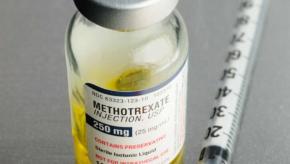Articles By Philip Mease, MD

Best of 2022: Methotrexate in PsA
Until the publication of the SEAM trial, evidence in the medical literature for the efficacy of the most commonly used drug for psoriatic arthritis worldwide, methotrexate, has been lukewarm at best. Yet we all employ it commonly, either as monotherapy or in combination with biologic or targeted synthetic DMARD treatment. It is inexpensive and widely available, and only modestly toxic.
Read Article
Pain in Psoriatic Arthritis
Pain is typically ranked by both patients and physicians as the most important symptom of psoriatic arthritis (PsA) to assess and treat. Although the predominant concept of the etiology of pain in PsA is that of inflammation in peripheral joints, entheses, and bone signaling through peripheral nociceptive fibers, perceived as pain in the central nervous system, it is actually more complex than that. The ability of a treatment to ameliorate pain is one of the principle measures of its effectiveness. Thus pain improvement or worsening are key determinants of shared decision making about treatment in PsA.
Read Article
Axial Disease in Psoriatic Arthritis
Inflammatory involvement of the axial skeleton and sacroiliac joints occurs, on average, in 40-50% of patients with psoriatic arthritis (PsA). When present, axial involvement is a “biomarker” of more severe PsA disease: more severe peripheral joint disease, enthesitis, skin disease, pain, impaired function and quality of life, and work productivity. Thus, it is important to recognize and include in a comprehensive PsA treatment approach.
Read Article
Methotrexate in PsA
Until the publication of the SEAM trial, evidence in the medical literature for the efficacy of the most commonly used drug for psoriatic arthritis worldwide, methotrexate, has been lukewarm at best. Yet we all employ it commonly, either as monotherapy or in combination with biologic or targeted synthetic DMARD treatment. It is inexpensive and widely available, and only modestly toxic.
Read Article



